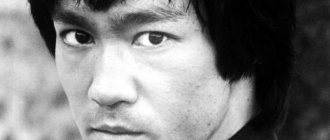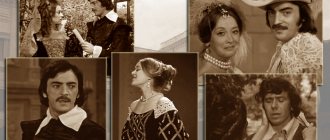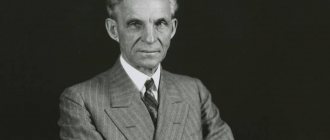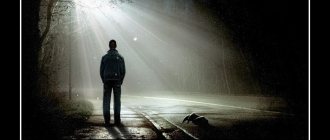The one who does nothing is not mistaken - several famous historical figures are considered the authors of this phraseological unit : - The most “elderly” on the list is the ancient Greek playwright Euripides (480s-406 BC). The following words are attributed to him: “A man who does a lot and makes a lot of mistakes.”
(The Internet unanimously repeats the phrase without indicating the source, and on the same Internet this thought does not appear in articles with aphorisms and sayings of Euripides)
— Next on the list is the Italian poet of the 16th century Giovanni Battista Pescatore (15..-1558), whose poem “The Death of Ruggiero” (Venice, 1548) says: “Chi non fa, non falla” - “Who does not does, does not sin" —
The German lawyer Paul Winkler, who lived in Brandenburg in the 17th century, wrote in his essay “Three Thousand Good Thoughts” (1685): “He who does nothing makes no mistakes;
and whoever does not make mistakes will not advance further” - V. Dahl included the maxim in the dictionary of Russian proverbs: “He who does nothing does not make mistakes; and whoever does makes a mistake” - the 26th President of the United States, Theodore Roosevelt (1858-1919), is credited with saying: “He who does nothing makes no mistake. Don’t be afraid to make mistakes - be afraid to repeat mistakes” - Russian writer A. N. Tolstoy (1883-1945) said: “He who does nothing makes no mistakes, although this is his main mistake” - V. I. Lenin (1870- 1924) did not stand aside: “He who does nothing practical does not make mistakes” (report at the V Congress of Soviets on July 5, 1918)
Analogues of the proverb “he who does nothing makes no mistakes”
- To make mistakes is human, but not to confess is diabolical.
- A wise man is ashamed of his shortcomings, but is not ashamed to correct them
- There is no shame in those who get lost on the road and return home.
- Make a mistake, but admit it
- He who carries water breaks the jug
...No initiative. Eyes to the ground and along the wall. Elevator - whack! - off to bed! Throw a blanket! - and you sit in a blanket. And no fiction. You come up with something, you will do it, and you will be punished for doing something bad (M. Zhvanetsky)
He who does nothing makes no mistakes
Indeed, in Soviet times the saying “Only he who does nothing makes no mistakes” was attributed to Lenin. In this form it is given in his canonical article “On the meaning of militant materialism” (1922). A quotation from Lenin’s report at the V Congress of Soviets on July 5, 1918 was also quoted no less often: “He who does nothing practical is not mistaken.” Of course, this idea does not belong to the leader of the world proletariat. The saying that serves as the title of this note probably came to us from the French language. This did not stop Vl. I will include it, slightly supplementing it, in “Proverbs of the Russian People”: “He who does nothing is not mistaken; and whoever does it makes a mistake.” With all due respect to the great lexicographer, he is not a decree for us here; As you know, Dahl considered even the famous aphorism of La Rochefoucauld “Neither the sun nor death should be looked at point-blank” as Russian wisdom. However, it was not the French who were the first to think of the infallibility of not doing, but the Italians of the Renaissance. In Italian it sounds much shorter: “Chi non fa, non falla”, that is, “Whoever does <nothing> does not make mistakes.” This phrase appears, for example, in Giovanni Battista Pescatore's poem The Death of Ruggiero (1546), which was a continuation of Ludovico Ariosto's Roland the Furious. The Italian maxim was developed in Germany in the 17th century: “He who does nothing makes no mistakes; and he who does not make mistakes will not advance further” (Paul Winkler, “Three Thousand Good Thoughts”, 1685). An equally popular proposition, “We learn from mistakes,” is a translation from the Latin “Errando discimus.” However, it would be a mistake to think that it belongs to the Latins - no, it appeared only in modern times. In the English neo-Latin poet John Owen we find the couplet: “You often excuse yourself by saying: we learn from mistakes. But if you make mistakes so often, why are you less and less smart? (“Epigrams”, 1606) But the maxim “To err is human” is truly ancient. It is found with various variations in many Greek authors, including Sophocles: “All people sometimes go astray, <...> We call the stubborn one crazy” (“Antigone”, trans. S. Shervinsky and N. Poznyakov) Hence the famous saying Cicero: “It is common for every person to err, but only a fool can persist in error” (Philippics, XII, 2, 5). St. Augustine translated this thought into the language of Christian theology: “To be mistaken is a human matter, to persist in error is a devilish matter.” In our time, many other continuations of the maxim “To err are human…” have appeared: ... but it is even more common to blame others (“Murphy’s Laws”). ...but it is better to err on the side of the directive (Kazimierz Slonimski, Poland). ...but only a superman can admit mistakes (Doug Larson, English racing driver and writer). ...but superhuman blunders require a computer (Paul Ehrlich, USA). Returning to St. Augustine, let us cite another of his sayings: “He who seeks is not mistaken (or: “He is not mistaken”)” (treatise “Against the Academicians”, I, 4, 10). This idea became popular among the Germans thanks to a line from Goethe’s Faust: “Es irrt der Mensch, solang er strebt”; in a free translation by B. Pasternak: “Whoever seeks is forced to wander.” In conclusion, a few more modern aphorisms: Lord, save me from the man who never makes mistakes, and also from the man who makes the same mistake twice (William Mayo, American physician). A man who never makes mistakes is a terrible bore (Anonymous American saying). A man who makes no mistakes receives orders from those who do (Herbert Prochnow, American financier and writer). Close the door to all errors, and the truth will also remain behind the doors (Rabindranath Tagore). We learn from ashipkas (Leonid Krainov-Rytov).
“He who does nothing, nothing will happen to him”
(The theme of life creativity in the prose of M. Gorky)
Hello, Alexey Maksimovich! You will, of course, be surprised to receive a letter from 2003: after all, more than sixty-five years have passed since the date of your death.
Over the years, many articles and monographs have been written, a huge number of dissertations dedicated to your work have been defended. You have been called a great writer, a successor to the traditions of L. Tolstoy and the founder of the method of socialist realism.
But at the end of the 20th century the situation changed dramatically.
A. Solzhenitsyn called you “a mediocre and tearful scribbler,” critics who sang hymns to you yesterday are throwing stones at you today.
It is common to say: “The dead don’t hurt.” But for some reason it seems to me that you are very hurt and offended, so in my letter I want to protect you from unfair blows and respond to your ill-wishers.
What seems most offensive to me is the accusation that you wrote not out of conscience, but to please the authorities. In this case, as a rule, the novel “Mother” is mentioned. I wonder, to please which authorities this work was created in 1906?! I am, of course, not a scientist or a literary critic, so I can only speak about my personal perception of this book. For me, “Mother” is a hymn to motherhood, this most beautiful and great feeling on earth. Only a mother, connected by blood and spirit with her child, is capable, in your words, of “reaching the clouds,” of becoming a true creator of life. Love for her son, and not passion for revolutionary ideas, helps Nilovna get closer to people. “The abundance of love, awakened so late in the chest by the disturbing tremors of life,” makes her a different person. In all the acute situations of the novel, it is essentially maternal feelings that can turn the world upside down.
Believing in the need for revolutionary changes in life, you, fearing anarchy, turned to your mothers: “Rus' will not perish if you, mothers, sacrificially pour all the beautiful and tender things of your souls into the bloody and dirty chaos of these days.” You called for action inspired by love and humanity, and this is life-creativity.
At the center of all your books is Man. In all the difficult moments of your life, your heart always sang a hymn to him, always affirmed the ideas of humanism.
In your romantic works you put forward the formula “man is life.” I would venture to add: “It depends on the person what his life will be like.”
In “Song of the Falcon” we have two life principles, two positions. The grey, cowardly and colorless life of the Snake is contrasted with the joy of the Falcon’s struggle. “The madness of the brave is the wisdom of life!” Your Danko, who combines pride and love for people, is among the “crazy” brave men. “I have the courage to lead you, that’s why I led you!” Probably, such a merger makes a person the creator of life. Danko is looking for a free, conscious existence for everyone, and his heart burns in the name of love for people who did not notice the death of the hero. But Danko dies absolutely happy: after all, his life was not lived in vain. It is not for nothing that the sparks of his burning heart are blue, the color of the sky.
Alexey Maksimovich, I really love your Chelkash, who managed to withstand and not break in a harsh life. Let us remember the episode when Chelkash gives Gavrila money. How beautifully the characters are revealed! “The shining face distorted by the delight of greed” of one and the contemptuous words of another: “Eh, felt! Beggar! Is it possible to torture yourself over money? Fool! Greedy devils. They don't remember themselves. They sell themselves for a nickel!” If you knew, Alexey Maksimovich, how relevant these words are for our time! People sell themselves, waste their money on little things. We will remain silent there, we will lie there, we will talk somewhere, not noticing that at the same time the human soul suffers.
It would seem that “thief, reveler” Chelkash is clearly not the creator of life! But isn’t it with the awareness of one’s significance, with the understanding that there are things in the world that cannot be crossed, that a person’s spiritual growth begins. “He...will never be so greedy, he will never become like this!..” In your works you yourself create life, beautiful, fierce, where there is no place for weakness, inertia, inertia. Therefore, such a place is occupied in them by music, which constantly accompanies your heroes: in love, work, striving for high ideals.
In the poem “Man” sounds, to use musical terminology, a hymn to the one who defeated Lies, Vulgarity, Despair: “He walks slowly but with firm steps through the ashes of old prejudices..., followed by the dust of the past like a heavy cloud... This is how a rebellious man walks - forward! And higher! Everyone - go ahead! And higher!".
A subtle artist, a great humanist, a thoughtful researcher of life, for me you always remain a great Russian writer who unshakably believed in human activity aimed at reorganizing life.
Bibliography
To prepare this work, materials were used from the site https://www.coolsoch.ru/
Information about the work ““Whoever does nothing, nothing will happen to him””
Section: Literature and Russian language Number of characters with spaces: 4708 Number of tables: 0 Number of images: 0
Similar works
Sets of essay topics for conducting a written exam in literature in the 11th grade of general education institutions, 2001/02 academic year
26099
0
0
... in one of the works of literature of the 20th century. 7. The originality of the problems of M. Gorky’s early prose. (Using the example of one of the stories.) 8. The theme of heroism in one of the works of Russian literature. No. 10 1. Pechorin and the “water society” in M.Yu. Lermontov’s novel “A Hero of Our Time.” 2. “Scary world! It’s too small for the heart!” (According to the lyrics of A. Blok.) 3. Duel of Pierre with Dolokhov. (Analysis of an episode from the novel by L.N. ...
Spur for the exam in 2002
408395
0
0
... typical features and, albeit indirectly, indicates who, in the author’s opinion, holds the future of Russia. (6-8) The theme of human destiny in one of the works of Russian literature In the January issue of 2001, V. Astafiev’s story “The Pioneer is an Example to Everything” was published. The date the story was written is designated by the author as “late 50 - August 2000.” As in many of the latest works of the famous...
History topics
304945
0
0
... , something else to do is small, small steps towards the justification of Hitlerism and the destruction of Russia Author: Bair Irincheev Link: https://www.youtube.com/watch?v=jkyt6_OH3Ow The great history of the Baltic limitrophes The emergence. Declaring our statehood · We had such a nice neighborhood nearby - knightly spiritual orders that tried to baptize Christians so that they could...
For those who want to lose weight
259502
2
0
... ? I'll try to do it immediately. This can be a godsend and an opportunity to diversify the menu both for those following the Sybarit program and for those who do not use it, but are watching their weight. Is it possible to place your recipe on the site, indicating your real first and last name? Thanks again. I wish you success and health. Your Elena Stoyanova. — Dear Elena, thank you for your quick response to my letter. What …
Error - activity indicator
The question of choice is difficult for many. And every person who takes his own life seriously must remember the words: “He who does nothing makes no mistakes.” It is in mistakes that there is an opportunity to know yourself, your potential. Errors are not only an indicator that a certain action was performed incorrectly. They also indicate that the person took an active position and began to transform the reality around him. Today he works as a waiter or cleaner, but if he continues to act, the scenery in his life will soon change. It doesn’t necessarily have to be the manager’s office right away. But definitely people who never tire of working will sooner or later find the right path and achieve the desired results.
The price of passivity
However, whoever does not make mistakes does nothing, and vice versa - a person without initiative, of course, will insure himself against mistakes, but at the cost of his own passivity. Even having the necessary professional skills, he prefers not to attend interviews with reputable companies, because he is afraid that his candidacy will be rejected.
When meeting a stranger, we always run the risk of getting rejected by him. Maybe this mysterious stranger will respond to signs of attention from a man, or maybe not. However, this does not mean that attempts will not be made on his part. After all, every strong person can come to terms with his own success and survive it. Inside, he is able to accept the fact of failure and will not blame either himself or the people who refused.









